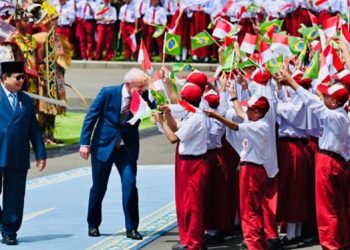Jakarta, Indonesia Sentinel — Jakarta residents’ reading interest reached a “high” category in 2024, with a score of 72.93, according to the Reading Interest Level (TGM) survey conducted by the Jakarta Provincial Library and Archives Office (Dispusip). The survey was carried out in collaboration with academics from the University of Indonesia and consultants from DGI Levner.
According to DetikEdu, the annual TGM survey measures reading habits and changes in how Jakarta residents access information, including the growing use of e-books, smartphones, and other technologies. Last year, Jakarta’s TGM score stood at 72.68.
Meanwhile, data from Indonesia’s Central Bureau of Statistics (BPS) showed that 99.42% of Jakarta residents aged 15 and older were literate in 2023. Despite the high literacy rate, approximately 0.58% of residents still lack reading and writing skills, particularly in areas like the Thousand Islands and West Jakarta.
Elva Farhi Qolbina, a member of Jakarta’s Regional Legislative Council (DPRD) Commission E, praised the survey results as a reflection of a growing reading culture in the capital.
“The Jakarta Provincial Government must ensure equal literacy opportunities for all residents to give everyone access to self-education,” Elva said.
Expanding Mobile Library Programs
Elva called for Dispusip to expand its mobile library programs, especially for children in hard-to-reach areas with limited library access. By bringing reading materials directly to communities, mobile libraries can help boost literacy in underserved regions.
She suggested enhancing these programs with creative activities like storytelling sessions and other literacy events. “Many children still look forward to the mobile library visits and see them as a highlight,” Elva said.
According to Elva, mobile libraries could also appeal to younger generations by offering relevant and engaging reading materials, as well as interactive reading experiences.
Study Finds Indonesia is the World’s Least Active in terms of Walking
To adapt to technology trends, mobile libraries could provide digital reading options such as e-books, which can be accessed on gadgets. “The younger generation is much more familiar with gadgets, and many prefer watching content over reading,” she noted.
Elva expressed hope that Dispusip’s innovations would foster a stronger reading culture among Jakarta’s youth, who represent the nation’s future.
“A literacy campaign supported by mobile libraries and amplified through social media can draw greater public interest and participation,” Elva concluded.
With continued efforts to expand access and innovate literacy programs, Jakarta aims to ensure that reading becomes an integral part of daily life, empowering future generations to thrive in an increasingly digital world.
(Raidi/Agung)
























